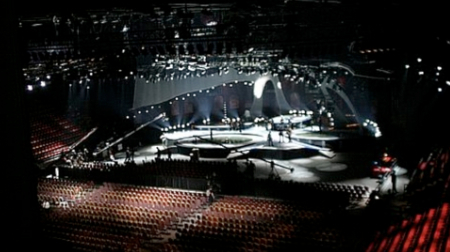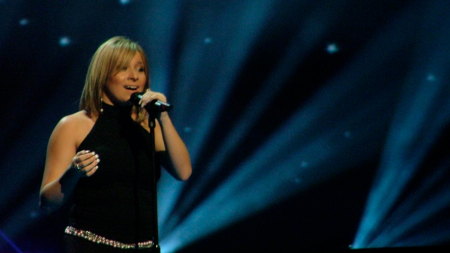They say time flies when you’re having fun. It’s difficult to believe that it’s been over a decade since Turkey won its first Eurovision Song Contest with Sertab’s ‘Every Way That I Can‘. Victory at Eurovision 2003 was regarded as a major breakthrough by the Turks since it afforded the national broadcaster TRT the opportunity to host the event in 2004, the same year that old adversary Greece were due to host the Olympic Games. Lots has changed in that time, let’s take a look down memory lane, 10 years later…
Turkey’s Eurovision win in 2003 was in many ways a breakthrough for the contest. Turkey had scored its first, and to date, only victory in the contest despite the fact that they had been entering for decades before, a feat which Greece and Finland would go on to emulate in the following years. The victory made headlines and was viewed by some politicians as having possible political ramifications for Turkey’s aspirations to join the European Union.
This is a milestone in creating an atmosphere for entry in the EU like we deserve […] it is a very important day […] Turkey has earned a lot of sympathy from the European people (Kursat Tuzmen, BBC News, 25 May 2003).
Soft Power To The People
Turkish victory in the Eurovision Song Contest also coincided with the wider peace process going on in Cyprus, which was reflected in the 2003 contest itself with the Turkish act receiving points from Cyprus for the first time in Eurovision history. The gesture was not lost on the spokesperson for Cyprus who made specific reference to on-going peace process during the broadcast from Riga. Victory in the Song Contest therefore represented a culmination of energies as the country worked towards acceptance in Europe, namely the EU. The Eurovision community had essentially recognised Turkey’s cultural contribution to the Contest which in turn, afforded the country the opportunity to be accepted as a European state. Note the tone of the language used in the quote from Kursat Tuzmen, “like we deserve”.

Under The Same Lighting Rig in Instanbul
Turkey staged the 49th Song Contest in Istanbul in May 2004. However, the initial planning of the event was somewhat chaotic with a late venue change from the Mydonose Showland to the larger Abdi İpekçi Arena. 2004 was also the first year that a live semifinal was introduced further adding to the pressure for TRT. The theme for the contest was ‘Under the Same Sky‘ which highlighted the significance of Turkish integration into a united Europe. The Minister for Broadcasting underlined how seriously the Turkish government viewed the Contest at the time:
I want to underline how important Eurovision is for the Turkish government, which regards the contest as a unique opportunity to promote Turkey in Europe. The event is […] more important than any other political summit (Soloman cited in Raykoff, 2007, pg 148).
Eurovision was a soft power tool for the Turks; the (questionable) notion that the Song Contest was more important than political summits can be seen as a rejection of the previous models of European integration that Turkey had been following. The subtext being that Turkey’s efforts had failed elsewhere yet, they had succeeded in Eurovision, which is based on a popular vote.
A Map Towards Trouble
The 2004 Contest featured the now customary postcard images; various beauty spots from around Turkey as well as historical sites were broadcast whilst the Turkish winner of Miss World, Azra Akin, introduced each national flag. The postcard images therefore served as a way of further promoting Turkish success on the world stage. It is interesting to note than much of the content was of a distinctly cosmopolitan nature; featuring café culture, nightlife, beach resorts and modern dance, suggesting that the show was produced with the European audience in mind.

Strong Every Minute, even without a map
The broadcast attracted strong criticism from Kurdish groups who claimed that the scenes portrayed cultural heritage from the Kurdish, Armenia and Syrian regions of the country. Yet, after closer examination of the 2004 broadcast, the unambiguous message from TRT was that this is a distinctly Turkish landscape. There was also controversy during the voting when a map of Cyprus was omitted from the on-screen graphics despite a map appearing for every other participating country. Arguably placing a map of Cyprus on-screen would have put TRT between a rock and a hard place; the international community do not recognise Turkish control of Northern Cyprus on one hand, and other on other, bowing to international pressure would have outraged more hard-line Turks.
National identity as a construction and the politics of nationalism are both reinforced through the Eurovision Song Contest in 2004.
Let’s Put On The Show Right Here!
Despite Sertab’s stiletto getting stuck on the grate in the stage and from the odd cringe-worthy moment from the presenters, from a technical perspective the show from Istanbul was slick and provided a chance for the Turkey to speak to Europe, on its own terms. It would take several years for the semi-final format to be consolidated and the 2004 effort by TRT provided the contest with a good place to start. Even a cursory glance over the media coverage from the time demonstrates the significant that the Turks attached to Eurovision ten years ago. Turkey first applied to join the EU in 1987 and like many countries on the periphery of Europe, Turkey used mega-events such as Eurovision and UEFA championships to gain a foothold in Europe and increase visibility on the world stage.
A decade later things are very different. Not only are there are two semi-finals, there is now no Turkey!
A Toast To Absent Friends
In 2013 Turkey withdrew from the Eurovision Song Contest. TRT cited that they were unhappy with the changes to the voting procedure amongst other things. This is curious given that under the current voting system Turkey have fared very well, including finishing 4th in 2009 and second in 2010.
Turkish friends of mine suggested that there were deeper issues at play here and that Turkey is moving away from Europe. On-going discussions concerning the increasing role of religion in the country and the decline of secularism appear to confirm this. Could it be that the withdrawal from the Eurovision Song Contest was a reflection of developments on the domestic political scene? Certainly the furore concerning the Finnish same-sex kiss and the apparent last-minute decision by TRT not to broadcast the final suggests that the political elite in the country appear to have fallen out of love with Eurovision and Europe.
The recent clampdown on protests in Istanbul highlighted the tensions simmering between Turkey and the EU. When the EU criticised the actions of the Turkish government, Egemen Bagis, Turkey’s EU minister stated “If we have to, we could tell them, ‘get lost’.” These are hardly the words of an EU-aspirant politician. If Turkey is moving away from Europe then the Türkvizyon Song Contest can be seen as a manifestation of this.
I recently caused offence (some people are so sensitive!) on Twitter when I said that the event was a poor imitation of Eurovision. I stand by that, however, I also see Türkvizyon as a symbol of protest, against fortress Europe and the EU who for too long have seen Turkey as the other. Perhaps the Turks have been hammering on the door for too long? There’s only so long somebody is willing to stand out in the rain before moving on.

Free alcohol is not an attractive option for Turkey
It’s truly amazing how quickly things change though. Greece and Cyprus both participated in Eurovision in Turkey in 2004 with little issues, something which was unthinkable only a decade or two before. In Sweden in 2013, just days before the final took place, the Greek group, Koza Mostra, performed at the Euro Cafe for the fans. They opened their set by performing Turkey’s entry from 2004, “Up”. Given the history between the two countries this in itself was pretty symbolic, however, the accompanying statement went further. “Turkey we love you, Turkey should be in Eurovision”.
Given the developments going on in Turkey with continuing debates concerning democracy as well as Turkey’s place in Europe more generally, I would be surprised if Turkey rushes back to the Contest in the near future. They’ve got their own show now, the Türkvizyon Song Contest; their own event on their own terms. I will miss Turkey in the contest, I usually liked their entries and Istanbul was an amazing experience (some of it not so good of course, namely the terrifying taxi journeys across the city!).
Perhaps one day they will be wooed back by the EBU? Or perhaps it is a case of “La fiesta termino”…









Interesting, but I truly don’t understand that post.
Who cares? This is just a song competition- nothing else!
If they want to be part of it- welcome! if not- fine by me.
The last thing Turkey needs to complain about is the voting system. They are the most beneficial ones, alongside with Russia, Greece, Romania, Azerbaijan, and Scandinavian and Ex-Yugoslavia countries, so let us be honest. They just want to separate themselves from the rest of us.
So that has been said, I guess my thoughts tend towards “La fiesta termino…”
And two other comments if I can raise here which I would really appreciate to read your thoughts here in similar long posts:
1. the real “brave” countries who keep on coming to the ESC knowing that they stand no chance with the current voting system (in my opinion- small countries with minor diaspora, such as: San-Marino, Israel, Malta. I think they are the real winners who deserve better treatment.
2. Betting odds web sites- this is SOOOO strange. This raises the question whether this competition is “fixed up”. Can someone please explain to me how come countries that didn’t pick up their songs yet rank so high in the betting odds? I mean: Norway, Azerbaijan, and even Sweden (before they chose their song). How is it possible? One answer- it’s fixed up!
To answer your question about betting websites, Lio anch, the odds for countries aren’t decided by some mystical Eurovision expert who knows what’s going to happen. They are purely decided on the amount of people who have bet on it, the more people who bet on something the shorter the odds get, people were betting on Norway, Sweden and Azerbaijan because looking at recent history they are reasonably successful and some people think a song in theor national final is good enough to place a bet on; the more bets made the shorter the odds.